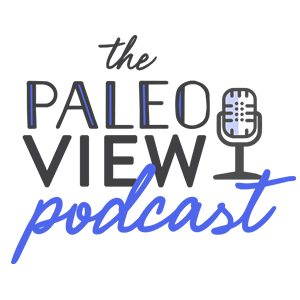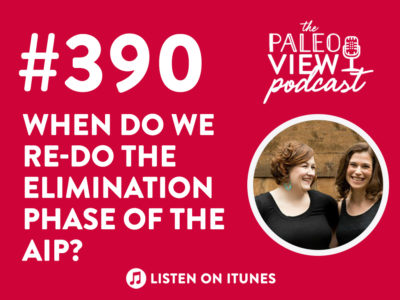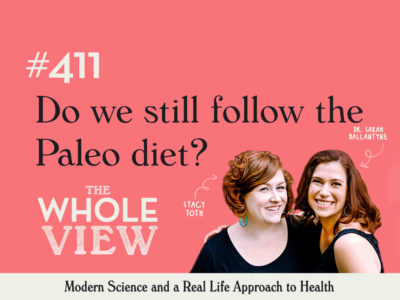On this episode of The Paleo View, Stacy and Sarah discuss a recent press release that sparked a fury of negative claims against the Paleo diet in the media – and share their thoughts on how we as a community should handle these misrepresentations of the Paleo diet.
Click here to be taken to iTunes
or download and listen by clicking the PodBean Player below
![]()
If you enjoy the show, please review it in iTunes!
The Paleo View (TPV), Episode 184, The Misrepresentation of the Paleo Diet in the Media
- Intro (0:00)
- News and Views (1:18)
- Sarah loves that the format of this podcast allows both her and Stacy to tackle current events as they are unfolding in the media
- And just this week there was a frenzy of negativity on the Paleo diet that was first shared in Australian media, and the stories then reached global media channels
- So for this week’s show Stacy and Sarah want to discuss the current media that is misrepresenting a scientific article and where that all came from, but to also discuss how Paleo tends to be very attacked in the media and how often we typically see critiques of the Paleo diet that completely misrepresent what the Paleo diet even is
- Stacy is curious to see what the long-term buzz around this media will be
- The first article that Sarah saw was from a British journal titled, “The Paleo diet is dangerous and increases weight-gain, diabetes expert claims”
- So this prompted Sarah to look into the science behind this article that supported this claim and she found that there was no link to the original research, however, she found other media articles on the same topic that led her to the original study
- Sarah shared the other sensationalized article titles
- Sarah was eventually able to dig through all the articles to find the original, and the title was ‘A low carbohydrate, high-fat diet increases weight-gain and does not improve glucose tolerance, insulin secretion, or beta cell mass in New Zealand obese mice’
- These mice were specifically developed in the last ten years to study diabetes
- They are a highly susceptible mouse
- How the study was structured and what the researchers analyzed from the results
- What the study revealed
- The rebuttal to the study that Sarah shared on her site HERE
- The conclusions from the researches on their abstract essentially said, “a low carbohydrate, high-fat diet is unlikely to be of benefit for preventing the decline of beta cell function associated with hyperglycemia and type-2 diabetics”
- Sarah’s takeaway was, ‘great – I too don’t agree with a ketogenic diet’
- However, the press release likened the structure of the diet that was used in the study to Paleo, by specifically calling out celebrities and stating that their recommendations have no basis in scientific literature
- Sarah gets worked up about this kind of critique of the Paleo diet because the study in no way represents the merits of a Paleo diet
- How shady Stacy found the quote on celebrities to be
- “Mass media hype around these diets, particularly driven by celebrity chefs, celebrity weight-loss stories in the tabloid media and reality TV shows are leading to more people trying fad diets backed by little evidence. In people with pre-diabetes or those with diabetes, the low-carb, high-fat diet could be particularly risky. Low-Carbohydrate, high-fat diets are becoming more popular, but there is no scientific evidence that these diets work. In fact, if you put an inactive individual on this type of diet the chances are that person will gain weight.” – this was said by the President of the Australian Diabetes Society
- Where there is merit in this authors points, and where he exaggerates the details
- The diet studied was structured around 81% calories from fat, 13% calories from protein, and 6% calories from carbohydrates
- This diet is a ketogenic diet to a T, and you can find more on Sarah’s site here on the negative effects of a ketogenic diet
- So first point, a ketogenic diet does not equal a Paleo diet
- The other problems with the press release and where the details were exaggerated
- Nothing in the study looked at the quality aspect of the foods endorsed by a Paleo diet
- There are two other episodes that discuss the difference between nutrient quality of a Paleo diet versus the nutrient quality of a ketogenic diet, which you can find HERE and HERE
- The ingredients of the diet used in this specific study and the questions surrounding the ingredients that were selected
- Why is Paleo so consistently misrepresented in the media?
- The level of frustration it gives Sarah to see science so grossly misrepresented in the media
- The responses from the Paleo community that discredit the study because it is done in mice, and Sarah notes that this isn’t a fair critique of the study
- Animal studies are incredibly well validated strategies for understanding human health
- It is a bad habit to dismiss evidence that may contrast with our views
- Recognize that we don’t have all the answers and be open to assimilating new information, even if it contrasts with previous studies
- It is responsible of us to look at studies objectively
- Sarah notes that it is important to think critically and that there is a way that we as a community can discourage such aggressive attacks by putting our support behind rebuttals, behind those who are being attacked, and commenting on these studies in a measured way
- The best response is measured and logical
- Definitely engage, but keep it mature and respectful – demonstrate just how much support this Paleo community really has
- And when you see media articles like this, try not to take them personally
- Stay true to what you know
- Don’t forget to tell your friends, comment on show notes and social media, and please leave those reviews
- Stacy also wants to thank those who came out to the event at the Organic Butcher
- Outro (1:02:31)









